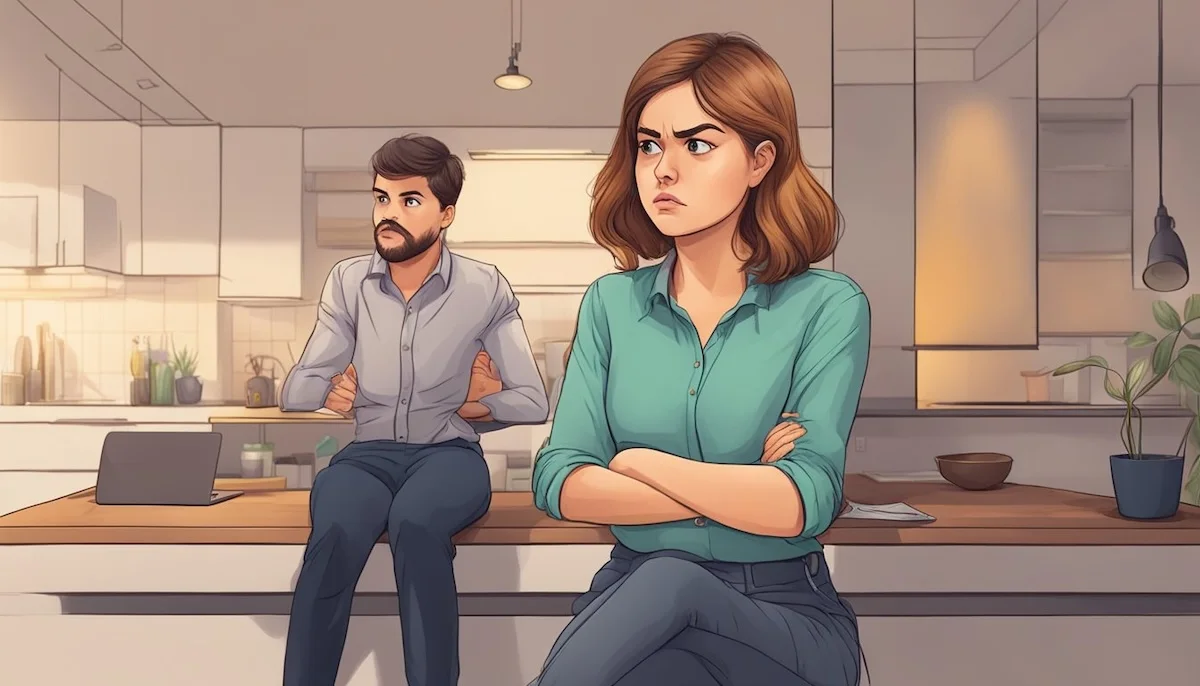Dating someone who gets mad over trivial matters can be troublesome and exhausting. When your girlfriend gets angry over small things, it might confuse and frustrate you. To navigate through this situation, it’s essential to empathize with your partner and understand the underlying causes of her behavior.
Identifying the root cause of her anger is a crucial step to take in addressing the issue. Common reasons people get mad over small matters include stress, heightened jealousy, or hormonal changes. Evaluating these possible causes can help you communicate more effectively and foster a stronger bond in your relationship.
By understanding your girlfriend’s emotional triggers and having an open dialogue about her feelings, you can cultivate a more harmonious environment where both of your emotions are acknowledged and respected.
Key Takeaways
- Understand the root cause of your girlfriend’s anger over small matters.
- Open communication and empathy can foster a stronger bond in your relationship.
- Addressing emotional triggers will lead to a more harmonious environment.
Understanding Emotions and Triggers
As you navigate your relationship, it’s important to recognize the emotions and triggers that lead to your girlfriend getting mad at even the smallest things. By understanding these factors, you can work towards a healthier and more harmonious partnership.

First, try to identify your girlfriend’s emotional triggers. These could be feelings of being overwhelmed, unheard, or unappreciated. If she’s experiencing such emotions, her reactions might be amplified, making her more likely to get angry at seemingly insignificant situations.
Here are a few common triggers to consider:
- Feeling unsupported or undervalued
- Experiencing stress in other areas of life
- Feeling insecure or jealous
- Struggling with unresolved past issues
Please pay attention to patterns and situations where she tends to get upset. For example, does she get mad when she feels you’re not listening to her or perceives that you’re not putting enough effort into the relationship? Identifying these specific triggers can be a helpful starting point.
Next, take a deeper look at your behavior. Do you do anything that might unintentionally exacerbate her anger or frustration? It’s essential to remain open and honest with yourself and be willing to make adjustments to create a more positive environment.
Here are some ways to help manage emotions and reduce triggering situations:
- Practice active listening to help validate her feelings
- Offer emotional support and reassurance
- Communicate openly and honestly
- Share household responsibilities fairly
- Make time for quality moments together
Remember, building a stronger relationship is a collaborative effort between both partners. By taking the time to understand your girlfriend’s emotions and triggers, you’re working towards a more loving and supportive partnership.
Why does my girlfriend get mad at me for the smallest things? Here are the most common reasons
She is stressed
Your girlfriend might be going through stress in her professional or social life, causing her to be more irritable. Ensure you provide her with emotional support and listen to her concerns, helping her relieve some of the stress.

She’s got anger management issues
She may face challenges in managing her anger. Encourage her to seek counseling or therapy to learn effective techniques for handling her emotions.
She is seeking attention
Sometimes, your girlfriend could feel neglected and crave more of your attention. Make sure to spend quality time together and show her that you prioritize her in your life.
She is on her menstrual cycle
Hormonal changes during her menstrual cycle may cause mood swings and irritability. Be patient and understanding during this time, offering support and comfort.
She has jealousy issues
Your girlfriend might experience jealousy, making her more likely to get mad quickly. Address these issues openly and work together to build trust and security in your relationship.
She has health problems
Specific health problems, such as depression or anxiety, might contribute to her becoming upset over small things. Encourage her to seek professional help if she experiences ongoing mental health challenges.
She is cheating on you
Infidelity could cause guilt and manifest as anger. Maintaining open communication and discussing any suspicions or concerns in your relationship is essential.
She thinks you don’t appreciate her
If your girlfriend feels unappreciated, she might lash out in frustration. Make sure to express gratitude and praise her for what she does for you, big and small.
She has low self-esteem
Low self-esteem may make her more susceptible to feeling hurt or upset by small things. Help her build her confidence by offering compliments and expressing your admiration for her qualities.
She is mirroring you
Sometimes, partners reflect each other’s behaviors. If you find yourself getting upset over small things, work on managing your emotions and practicing patience. This might create a more harmonious environment for both of you.
Does my girlfriend have anger issues?
It’s natural for everyone to feel angry at times, but if you notice that your girlfriend frequently gets mad at you for minor reasons, she might have anger issues. Understanding the root cause can help you navigate these challenges and maintain a healthy relationship.
When determining if your girlfriend has anger issues, it’s essential to consider the frequency and intensity of her anger. Is she becoming overly upset over small issues or tasks regularly? If so, this could be a sign of an underlying problem. Anger issues might manifest in outbursts, passive aggressiveness, or shutting down completely.

One reason your girlfriend may be exhibiting anger over small issues could be stress. High-stress levels can make it difficult to regulate emotions, causing a person to overreact to minor incidents. In this case, practicing empathy and patience can go a long way. Help your girlfriend identify sources of stress and work together to find healthy coping mechanisms.
Another possibility might be poor anger management skills. If your girlfriend was never taught how to handle anger, she might struggle to manage her emotions effectively. Encourage her to acknowledge her feelings and express them calmly and respectfully. Open communication and understanding are crucial for resolving conflicts and improving emotional intelligence.
Lastly, it’s worth considering if there may be deeper issues at play, such as past trauma or mental health concerns. If you suspect that these factors might be contributing to your girlfriend’s anger issues, it’s essential to approach the topic delicately and encourage her to seek professional help if needed.
Remember, you should approach these situations with a friendly and caring attitude. Maintain open communication and encourage your girlfriend to share her feelings, as this can help strengthen your relationship and make it easier to handle conflicts. Don’t forget to take care of yourself, too – your emotional well-being is just as important.
What should I do if my girlfriend gets mad at me for the smallest things?
Please don’t make her feel bad
First of all, avoid making her feel bad about her emotions. Validate her feelings and let her know that you understand how she feels. Maintaining a sense of empathy is vital in any relationship, and respecting her emotions is essential for building trust and a strong bond between the two of you.
Encourage her to talk
Encourage her to express her thoughts and feelings. This can help you better understand her perspective and what might be causing her frustration. Make sure to actively listen and engage in the conversation without judging her or arguing. Show genuine interest in her concerns and make her feel heard.
Ask her if she only wants to vent or if she wants you to help with solutions
Sometimes, people need someone to listen and empathize with their feelings. Ask her whether she wants to vent or if she’s looking for potential solutions. This approach shows that you’re considering her perspective and are open to offering assistance while respecting her need to process the situation independently.
Help her look at the bright side of things
Without downplaying her feelings, gently remind her of the positive aspects of your relationship or life. Encourage her to focus on the good things and avoid dwelling on minor inconveniences. However, be careful not to push her too hard, as this needs to be done delicately.
Don’t get defensive, and have empathy
You need to remain calm and avoid getting defensive when she gets mad. This helps create an environment where constructive communication and conflict resolution occur. Additionally, showing empathy and understanding will help her feel more comfortable sharing her feelings with you.

In summary, if your girlfriend gets mad at you for the smallest things, it’s essential to approach the situation with patience, empathy, and understanding. Encouraging open communication and establishing mutual respect and boundaries can help create a healthy and fulfilling relationship.
Does it mean my girlfriend doesn’t love me anymore?
If your girlfriend gets mad at you for the smallest things, it might make you wonder if she still loves you. It’s important to remember that all relationships have ups and downs, so it doesn’t necessarily mean she doesn’t love you anymore. There could be various reasons behind her behavior, and this section will help you gain a better understanding.
Communication issues: Misunderstandings can often lead to arguments and frustration. Ensure you both effectively communicate your thoughts and feelings to avoid unnecessary disputes.
Stress and external factors: Sometimes, people may take out their stress from work or other aspects of life on their partners without realizing it. If your girlfriend is going through stress in other areas of her life, it might cause her to be more irritable or sensitive in your relationship.
Expectations and compatibility: It’s possible that your girlfriend has certain expectations of you that you might not be aware of or that you find unrealistic. These unmet expectations could make her upset with you over seemingly minor issues.
To navigate through this situation, consider these steps:
- Have an open and honest conversation: Try to discuss with your girlfriend how her reactions make you feel. Ask her if something is bothering her or if she has hidden concerns about the relationship.
Listen and empathize: Remember, being a good listener and showing empathy when discussing sensitive topics is important. Give her a chance to express her feelings and ensure she knows you are genuinely interested in understanding her point of view.
- Work together to find solutions: Pledge to find solutions to these issues and try to be more attentive to her needs and preferences. This can strengthen your bond and help you emerge even stronger as a couple.
Remember, dealing with such situations can be challenging, but it’s important to approach them with patience, kindness, and empathy. Do not jump to conclusions about your girlfriend’s love for you based on her reactions to small issues. Work together to overcome these challenges and further strengthen your relationship.
Final Thoughts: My girlfriend gets mad at me for the smallest things
Feeling confused and frustrated when your girlfriend gets mad at you for the smallest things is natural. It may seem like her anger is disproportionate to the situation. As a first step, identify any triggers or underlying issues driving her emotions. Remember, maintaining open communication is essential in addressing these concerns.
While it may be tempting to dismiss her anger due to its seemingly trivial nature, reflect on your behavior and how it might affect the relationship. Consider exploring deeper reasons for her reactions, like past emotional experiences she’s had or the possibility she’s feeling overwhelmed by outside factors. Listen attentively and try to empathize with her feelings.
Keep in mind that everyone has their unique ways of expressing emotions. It’s essential to build a strong foundation of trust and understanding in the relationship, where you both feel comfortable sharing your thoughts and emotions. Maintaining a positive environment can help establish open dialogue and resolve potential issues.
Lastly, patience is crucial. Emotional intelligence and self-awareness take time to develop, but with dedication and understanding, both parties can work together to build a healthier and more harmonious partnership. Remember that nurturing a solid relationship takes effort from both sides.
Stay friendly and compassionate, and let your girlfriend know that you’re open to working together to understand and address the reasons for her anger. A robust and supportive connection between you both can pave the way for a more stable and loving relationship in the long run.
Frequently Asked Questions
Your girlfriend may be experiencing stress, insecurity, or other emotions that make her more sensitive to small issues. She might also lack emotional intelligence, which can lead to reacting impulsively instead of logically.
When your girlfriend gets angry over small things, try to remain calm and understanding. Listen to her concerns, validate her feelings, and use “I” statements to express your point of view. For example, instead of saying, “You’re overreacting,” try saying, “I feel hurt when you get angry at me for small things.”
If your girlfriend always seems angry, underlying issues may need to be addressed. This could be related to stress, mental health, or unaddressed concerns in your relationship. Communicating openly and honestly about these issues is essential to understanding each other’s perspectives better.
Clear, open, and empathetic communication is crucial. It’s important to create a safe space for discussion without judgment or blame. Use active listening techniques, like restating her concerns to ensure they are understood, and express your thoughts and feelings with “I” statements.
Try to put yourself in her shoes and empathize with her feelings. Ask questions to gain insight into her thoughts and emotions. Be open to receiving feedback, and be willing to adjust your behavior and expectations if necessary.
Yes! Open communication and understanding are essential to any healthy relationship. Work on building trust, supporting each other’s emotional needs, and setting boundaries. It’s also a good idea to explore activities and hobbies you can enjoy together, fostering a sense of shared purpose and strengthening your bond.
